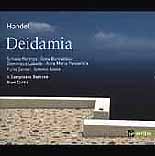After the failure of Deidamia in 1741, Handel turned exclusively–and successfully–to the composition of oratorios. And while it’s true that tastes in England had changed over the years from the madly Baroque works that made him famous, it can’t be denied that there is something missing from his last operas: the energy level is lower, his instrumentation is simpler (almost all the arias in his last two operas are for strings alone, with an occasional oboe tossed in), and his interest in dazzling with vocal showpieces is rarer. His penultimate opera, Imeneo, is an intimate, uncomplicated story about (mostly) unrequited love, and it clocks in at two hours; it takes three to unravel Deidamia, and its men-disguised-as-women plot isn’t grand enough to house the 35-or-so brief arias.
The whole story can be summarized easily: Achilles, Deidamia’s fiancé, is dressed as a woman and is hiding at the court of her father, Lycomedes, so he won’t return to Troy and die, as has been prophesied; Ulysses (also in disguise), who has come from Troy to drag Achilles into battle, is therefore deceived. Confusion ensues, with Ulysses somewhat innocently flirting with Achilles, and Nerea, Deidamia’s confidante, being wooed by Ulysses’ ambassador, Fenice. The outcome is that Achilles and Deidamia do marry but he also decides that he will return to Troy with Ulysses–he can be both hero and husband. The opera’s closing words advise that we take our pleasures while we may. Deidamia has vaguely comic elements, and almost all of the arias are in a major key. The whole opera has an uncertain tone, but it’s not particularly ironic; if the truth be known, it has a defeated aura about it.
Ulysses is the leading man–at the premiere the role was taken by a castrato. He, rather than Achilles, gets five arias and shares the score’s only duet with Deidamia, underlining his importance. Here the role is sung by a mezzo-soprano, Anna Bonitatibus; she has a fine, darkish tone and is as good at exclamation as she is at coloratura. Her aria, late in Act 2 (“No, quella belta non amo”), is stunningly sung, with every note of fiorature in place. Simone Kermes is Deidamia. Her upset with Achilles (“Va, perfido”) when she thinks he’s going to leave her is fine for its many mood changes, and in general her lovely tone and easy technique impresses, save at the very top. (In the only competing recording, on Albany/Troy, the Deidamia is the ravishing Julianne Baird, and she sings Kermes under the table.)
Achilles, sung here (as at the premiere) by a woman, is Anna Maria Panzarella, and it’s a strangely unsatisfying role–the warrior seems not to take his life as seriously as everyone else does. Maybe that’s the irony. At any rate, Panzarella is very good, even if she only occasionally sounds boyish (though that may be the point). Dominique Labelle almost walks away with the show as Nerea. Her saucy phrasing and juicy, distinctive timbre make you sit up and listen carefully whenever she opens her mouth. Two baritones, Furio Zanasi as Fenice and Antonio Abete as Lycomedes, round out the cast. The former is lighter and so is his attitude; he doesn’t have much to do, but his rhythmic accuracy is perky and welcome. And the latter’s darker hue and serious demeanor set him apart.
But it is Alan Curtis’ conducting of Il Complesso Barocco that makes this recording work as well as it does. It is remarkable for its conciseness and for its intelligent use of dynamics (which emphasize drama when there is little in evidence), with recitatives done at a natural, conversational speed, slowing down when necessary and always with heed to what’s being said. The singers embellish their vocal lines, but not always sensibly or appealingly. The small orchestra–16 strings (including continuo) and pretty sparsely used trumpets, bassoon, oboes, horns, and timpani–play beautifully, with sharp, decisive attacks and spotless ensemble. The recording is equally good. And so, if this work interests you, this recording is heads above the older Troy/Albany version (with the exception noted above) and is recommended.
































